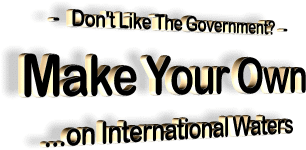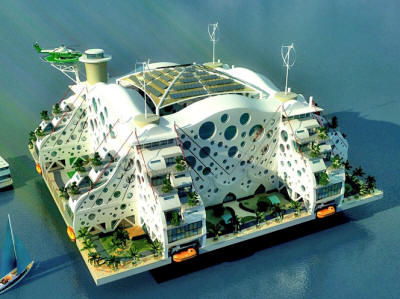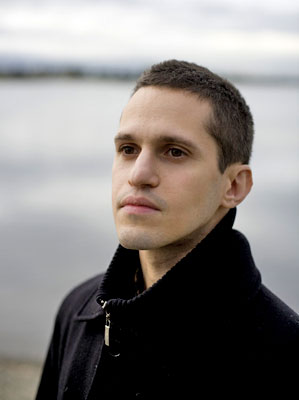|

by Laura Sydell
December 17, 2012
from
NPR Website

Andras
Gyorfi's winning entry in The Seasteading Institute's 2009 design
contest.
The institute
supports the idea of permanent, autonomous offshore communities,
but it does not
intend to construct its own seasteads.
Courtesy of The Seasteading Institute
Almost all of us have complaints about the government, which
probably range from high taxes to too much bureaucracy.
Periodically, we get to take our frustrations out at the voting
booth.
But no matter how unhappy you may be, you probably never
thought,
"I'm going get out of here and go
start my own country."
A group of rich techies in Northern
California is planning on
starting its own nation on artificial
islands in the ocean.
They call themselves "seasteaders" and
are sort of a mix between geeks and hippies.
The visionary behind the group is Patri Friedman. The former
Google software engineer also happens to be the grandson of the
Nobel Prize-winning economist and free marketer Milton Friedman.
It's his voice that opens a trailer for a documentary (far below
video) about the seasteaders. As his words float above visuals of rolling waves we
hear what sounds like a vision of paradise at sea.
Friedman imagines that on these islands there will be,
"a lot of tourism from the world.
The most cutting-edge hospital facilities on the planet.
Probably the largest fish farms in the world."

A winning entry in the Seasteading Design Contest by Emerson Stepp.
Courtesy of The Seasteading Institute
And for foodies: "Best sushi you can imagine."
For-Profit
Communities
The seasteaders have been meeting regularly at bars in Silicon
Valley and San Francisco to discuss their plans for creating nations
at sea.
One meeting at a bar in Millbrae, Calif., drew a mix of people with
long hair, beards and wizened faces; casually dressed engineer
types; and a few suits. It was mostly guys.
There was a lot of chatter about what's wrong with our country -
everything from the school systems and the bickering in Washington
to the rising price of health care and long lines at the department
of motor vehicles.
"They just want to avoid taxes so
they can own what they make," says filmmaker Adam Jones, who
became part of the group because he shares their frustration.
"So they can truly be free and
that's the nature of true liberty and that's what the founders
wanted in America."
There's revolution in the air here.
Michael Keenan, the former president of
The Seasteading
Institute, opens the meeting. The institute is a nonprofit that
helps get backing for groups that want to start island nations.
Keenan leads the discussion, which is all about the practicalities
of life at sea: everything from desalinating sea water, to using
waves to create electricity, to figuring out how to build homes.
But it certainly doesn't sound like the rough and tumble lives of
the Back-to-the-Land Movement in the 1960s.
Keenan says seasteaders will most likely
begin life "with retrofitted cruise ships and barges" docked in
international waters.

Patri Friedman, head
of The Seasteading Institute,
says the beauty of
his vision for seasteading is choice.
Christopher Rasch/Courtesy of The Seasteading Institute
He says they are also working on ways to create artificial islands
using technology from oil rigs.
But if hippies in the 1960s were talking about communities built on
love, this group is talking about communities built around profit.
"That is the core of the future of
seasteading: sustainable businesses," Keenan says. "And so our
huge focus right now is on basically enabling more seasteading
business."
Vote With Your
Boat
The seasteaders do have some hefty backers.
Among them is Peter Thiel, an early investor in Facebook and PayPal, and of course Patri
Friedman.
Like his grandfather, Friedman is a believer in free markets and
would like to see a libertarian nation on the ocean.
But the ocean
is big, and Friedman sees room for plenty of different kinds of
governments.
"If we can figure out how to let
people create startup countries, they might start different laws
and institutions and constitutions," he says.
Friedman says there can be competition
between the nations over the best form of government the same way
there is in business. People could pick their government the way
they do computers and coffee.
"What if I got the same type of
service from my government that I do from Apple and Starbucks?"
he says. "What an awesome world that would be!"
But Friedman's comparison to businesses
raises red flags for Holly Folk, an expert on alternative
communities.
"It's difficult for me to respond
positively to a movement that says, 'OK, let's create a carve
out for people who have the resources to in some ways game the
global system,' " she says.
The Sea is a Harsh Mistress-Redux
Folk thinks if the seasteaders got in trouble on the high seas
they'd probably need help from taxpayer-supported services like the
Coast Guard.
A professor at Western Washington University, Folk has studied a lot
of alternative communities within the U.S. She says the ones with
shared religious beliefs, like the Pilgrims, last the longest.
Many alternative communities start out with lofty ideals, she says,
but the challenges of sharing resources and living together are
often greater than people imagine.
Folk says the seasteaders might find it even more challenging
because of their "individualist, libertarian flavor."
"You're talking about a worldview that's going to be attractive to
people who are in some ways probably not hard-wired to behave and
take orders very well," she says.
Folk says the history of the U.S. is littered with intentional
communities that fell apart.
Some run out of money and then bicker
over who gets the last piece of bacon; others don't last because the
second generation doesn't want to keep the community going.
But, Friedman says, the beauty of his vision is choice. Just like
you can pick what computer to buy, you can pick your government.
"I won't go there if it looks like it's going to be Lord of the
Flies," he says.
Friedman says no one is being forced into this.
"So people aren't going to go there unless it looks like it's safe,"
he says.
The first community that calls itself a seastead doesn't really
sound like a country or even a community. It wants to put a ship off
the coast of San Francisco so that entrepreneurs who can't get a
green card can start a business and still be close to Silicon
Valley.
The community expects to launch in 2014 - and expects to be
profitable.
|




